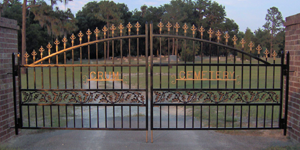


Whitesville/Summerfield History
Colonel Adam G. Summer moved to Marion County in 1856 from Pomaria SC and settled on 1,400 acres in an area called Watula, or Long Hammock. On the Summer Plantation Col Summer worked to develop improved livestock by cross breading and also began experimenting with different types of grasses. However, his greatest interest was in livestock. He started with cattle purchased from William Edwards in Micanopy, and then he began importing blood strains from elsewhere. In 1860, Col Summer imported six Brahman calves from the East Indies. This shipment also brought Bremen geese and other fowls; a number of fine horses and an English Foxhound.
By 1866 there were fifty Brahma and other high grade cattle, as well as other livestock on the Summer Plantation. After the Civil War, Colonel Summers established each of his former slaves on a tract of land, and with a shack to call their own. Not much, to be sure, but more vital to the ex-slaves that their new found freedom. Colonel Summer's former slaves now had places to live and were scattered over an area from Belleview to the Sumter County Line. Col Summer's livestock and plantation endeavors were cut short with his death in 1866.
Charles H. White came to Florida after the Civil War and settled the community of Watula, Long Hammock. Charles was the postmaster and opened the first general store which was located on the present site of Summerfield's Methodist Church. There was also a school, a blacksmith shop, a saw mill, a grist mill, a cotton gin, a Methodist church, the express telegraph office and shipping station. Unimproved land sold for $10 per acre and the main items grown were cotton, oranges and vegetables.
In 1873, Watula, Long Hammock, was named Whitesville for Charles H White. It was located on the north bank of Summers Lake, 3/4 of a mile west of today's Summerfield.
Fletcher Fink owned the land immediately north of Whitesville. In 1880 the railroad requested a right of way through Fletcher Finks land to build a railway. Fletcher Fink refused their request and would not allow them to cross his land. The railroad retaliated by routing their railway eastward away from Whitesville and refused to put a station in Whitesville. The railroads boycott was a disaster for Whitesville. Two miles further east a station was established and called Like weir. Ten years later, a spur was built from this station to the shores of Lake Weir at Weirsdale.
Finally, in 1887 a compromise was reached and a new railroad station was built in Whitesville. More settlers came to this area from the Carolinas, Georgia, and Alabama, and in 1888 the name of Whitesville was changed to Summerfield, honoring the late Colonel Adam G. Summer.
1882 Marion County Map
1890 Marion County Map
Information from the Florida State Gazetteer and Business Directory Vol.1, dated 1886-1887 shows the following:
| Mrs. M. E. Bittinger | Teacher |
| Lemuel G. Dillard | General Merchandise |
| S. F. Frank | Saw Mill, Grist Mill and Cotton Gin |
| Frederick S. Lucius | Boarding |
| Adolph D. Mitchell | Boarding and General Merchandise |
| William V. Newsome | Physician |
| Rev. J. H. Norton | Pastor of Methodist Church |
| William Snow | Blacksmith |
| Charles H. White | Postmaster |
Ayer
L. G. Dillard
F. S. Frink
S. R. Fink
C. Henderson
W. Lucius
C. H. White & Brothers
Vegetable FarmersL. G. Dillard
F. S. Frink
S. R. Fink
C. Henderson
W. Lucius
C. H. White & Brothers
J. Blackburn
Carter Brothers
Paul Cook
Q. Cowan
H. L. Craig
C. G. Culverhouse
T. N. Davis
Carter Brothers
Paul Cook
Q. Cowan
H. L. Craig
C. G. Culverhouse
T. N. Davis
L. G. Dillard
F. J. Dodson
W. J. Dodson
T. W. Holland
D. D. House
N. J. Johnson
C. L. Livers
F. J. Dodson
W. J. Dodson
T. W. Holland
D. D. House
N. J. Johnson
C. L. Livers
F. S. Lucius
A. D. Mitchell
W. Lucius
W. V. Newsom
I. Nix
C. Perry
P. H. Nugent
A. D. Mitchell
W. Lucius
W. V. Newsom
I. Nix
C. Perry
P. H. Nugent
J. Perry
K. B. Perry
Polk & Ayer
Proctor
J. R. Proctor
B. Thomas
Redding & Williams
K. B. Perry
Polk & Ayer
Proctor
J. R. Proctor
B. Thomas
Redding & Williams
Copyright © 2025
Crum Cemetery Association
All Rights Reserved
All Rights Reserved
Crum Cemetery Association
PO Box 223
Summerfield, FL 34491
PO Box 223
Summerfield, FL 34491